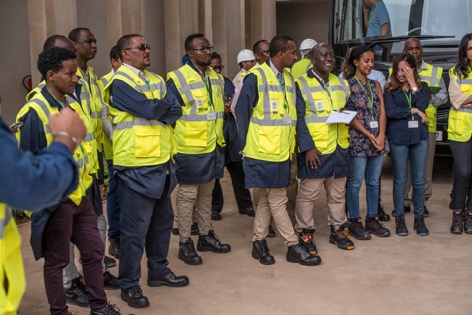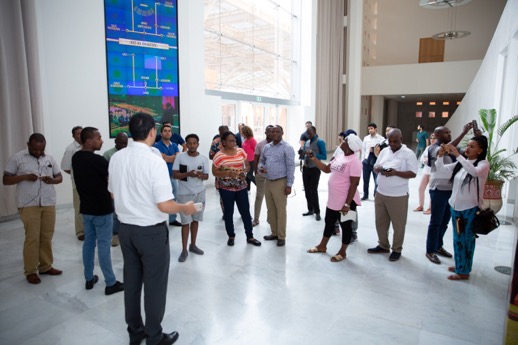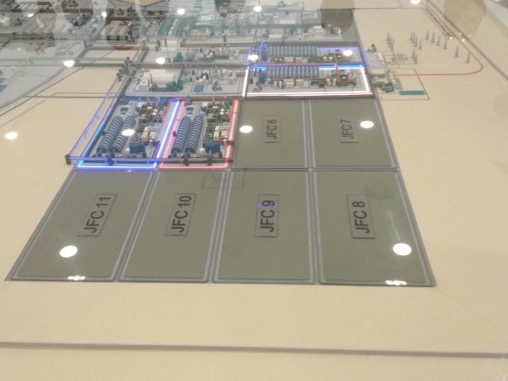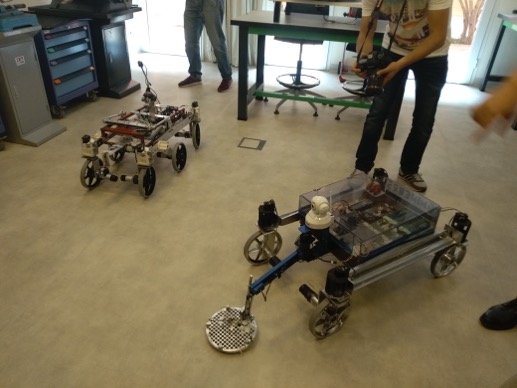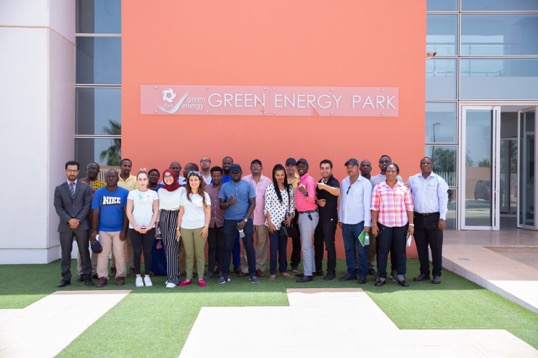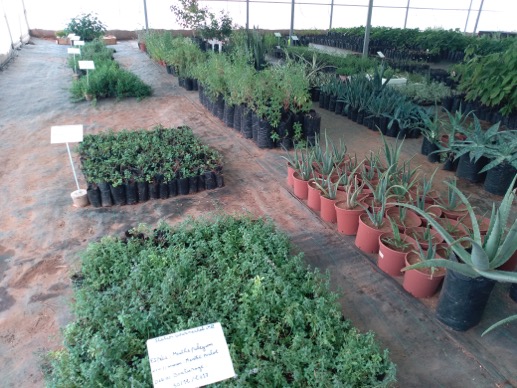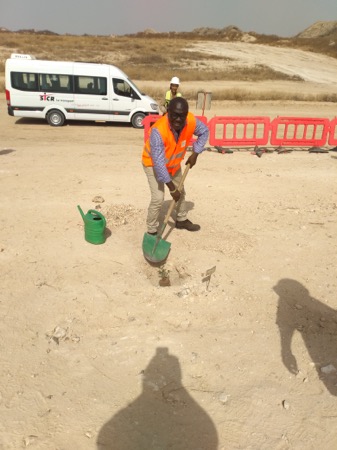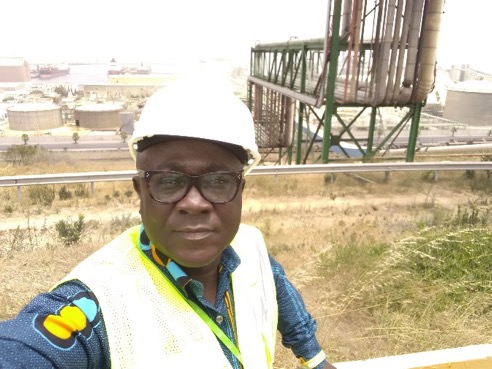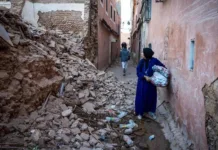
On the 30th of July 2018, I had to keep wake for fear of oversleeping because I had to catch a flight to Casablanca, Morocco, which was scheduled for 5am. The schedule time meant that I had to be at the airport by 3am in the morning. The pages of the travelogue was thus opened with an expedition to the land of phosphate deposits at the invitation of OCP Group, for a first hand experience on how the would-be ECOWAS country, Morocco, is turning its fortunes around with the only natural resource it is gifted with, phosphate.
After the four and a half hour flight, I touched down at the Mohammed V Airport at about 11am local time. It took nearly two hours to go through the queue, Moroccan boarder agency processes and security checks before gaining access into Casablanca.
Meeting The Team of Journalists
Upon my exit at the airport, an OCP-arranged vehicle was readily available to transport me and a senior colleague from Daily Graphic, Doreen Hammond, to the Le Casablanca Hotel, which would be our home for the next seven days. After some 30 minutes of driving, we arrived at the hotel. All 17 journalists who had been selected to participate in the familiarisation tour were already seated at table for lunch. Doreen and I thus joined them for same. Here is a quick roll-call of the Media team: Makda Yohannes Viers, Allafrica.com, Kenya; Christian Akorlie – Ghana News Agency; Bennett Eyituoyo, THISDAY Newspaper, Nigeria; Nurudeen Akande, Nigerian Tribune Newspaper; Ruth Ebaume – FRCN (Federal Radio Corporation of Nigeria); Essiet Daniel – The Nation, Nigeria; Zerihun Teshome, Zami Radio Station. The rest are, Dagnachwe Gihon, Ethiopian News Agency; Yayeswe Shimelis, Zemen and Tibeb Magazine; Dawit Endeshaw , The Report New Paper; Neville Charles – Raia Mwema Newspaper; Ruziga Mesantura – RBA (Rwanda Broadcasting Agency); Emmanuel Mugisha – Rwanda Media Commission (RMC); Athan Tashobya – The New Times; Sibomana Bonc – Rwanda Broadcasting Agency (Camera man) and Doreen Hammond, Daily Graphic, Ghana.
The briefing
After the lunch session, it was time for the team to be briefed on the planned programme of activities with regards to the week-long visit. Three officials from the OCP Group who were detailed to be with us took us through what was to be expected ahead of our week as journalists. After the briefing, everyone took to their rooms for reprieve pending dinner. At about 8pm, the team stepped out in our 40 seater black Volvo bus for dinner in town. Effectively, day two had ended.
The Starting Point
The OCP Group’s international office in Casablanca was the starting point for the entire tour. At about 9am, the team took our seats and the Managing Director, Mustapha El Ouafi, took us through a 20-minute presentation on OCP and the work it does. After a few questions for clarification on some of the issues raised, the team embarked on it’s first road trip to Khouribga, the phosphate city of Morocco.
The Khouribga Experience
Upon arrival in Khouribga, the team was hosted to lunch at the OCP Club House in Khouribga after which we were taken through an Environmental Health and Safety session. The team then visited the OCP phosphate exploitation industrial facilities (La 8400 / dragline, industrial laundry of Beni Amir, the slurry pipeline and monitoring tower). From this facility, OCP Group derives it’s raw material (phosphate), for transportation to its processing facility.
The Processing Facility
The OCP Group’s Jorf Lasfar, phosphate based production plant, the world’s biggest multi billion dollar phosphoric acid and phosphate based fertilizer production hub located in Morocco would be our next place of visit. Here, the OCP processes phosphate into fertiliser and other phosphate-base products for export. Other facilities the team visited include the Ligne phosphoric acid production facility, Africa Fertilizer Compagny (AFC), JFC’s & Downstream, Water desalinization structure and the Harbor.
The Harbor Facility
The harbor facility caught my attention because of its strategic location right next to the processing facility. The location of the port makes it an easy process to export directly from the Jorf Lasfar processing plant.
Morocco and the OCP Group
Morocco has the largest deposits of phosphate in the world with reserves that can be exploited the next 700 years. OCP Group is the company charged with the responsibility for ensuring that Morocco as a kingdom continues with it’s phosphate and fertilizer production to achieve their motivation and ambition of ensuring that the soil is fed in order to feed the planet.
From 1920 when OCP started its mining work in Morocco, the organization has undergone various levels of transformation. Currently, the main focus of the OCP Group, is to produce a wide range of phosphate-based products to meet specific needs of cultures and livestock around the globe, produce high quality and soil-specific fertilizers based on research to feed farms all over the world to boost food production.
OCP is the largest phosphate producer in the world and a leading global fertilizer player, backed by almost a century of production history. OCP has exclusive access to the world’s largest phosphate rock reserve base. It is one of the lowest cost producers of phosphate rock in the industry and has become a leading player in production and trade volumes across the phosphate value chain. OCP employs approximately 21,000 people and contributes to regional development through its mining and fertilizer operations and through its sustainability program.
OCP Africa was created in 2016 to work hand-in-hand with farmers to contribute to unlocking Africa’s vast agricultural potential. The organization produces fertilizer solutions customized to local conditions and crop needs, and works with partners in many different African governments, non-profits and private enterprises to connect farmers to the agricultural services, knowledge and resources they need in order to prosper. With a presence across the continent, OCP understands the diversity and complex needs of Africa’s soils, and remains committed to offering the right fertilizer products at the right time, in the right place, at the right price. OCP Africa is a subsidiary of OCP Group which has almost 100 years of experience.
OCP Group boasts of a three phased production value chain that is based on the use of advanced technology. First, the raw material, phosphate, is mined from its reserves in Khouribga, in south west Morocco. The raw material is then transported through pipelines to the industrial facilities also located in Khouribga for washing. When this process is completed, the washed phosphate product is then transported via a world class, underground, 200 kilometer pipeline from the Khouribga facility to the Jorf Lasfar processing plant to be processed into Fertilizer and a wide range of phosphate-based products and derivatives for local use and for international exports.
OCP Corporate Social Responsibility
Directly linked to the work of the OCP Group is their comprehensive plan to give back to the locals wherever they operate a facility. The main driving force for this corporate social responsibility is education.
1337 Centre
The 1337 Coding School, is one of several set ups by the OCP Group to educate and give back to society. The coding school enrolls students from Khouribga and other cities of Morocco, house, feed and teach them for free with all expenses paid for by the OCP Group.
Mohammed VI Polytechnic University
As part of its mission to promote research and development, The OCP Group has built and outdoored a world class Polytechnic University called “Mohammed VI”. Located in the Green City of Benguerir, 50 miles north of Marrakesh, The University will emphasises research and development in areas critical to OCP Group’s development such as mining, sustainable development and industrial management.
Green Energy Park
OCP’s green energy park also located in the city of Benguerir is the first if its kind on the African continent. The park has as its objective to mutualize resources, create synergies and position Morocco as a leader in innovation in the field of renewable energies. The $25 Million Dollar (220 million DH) pilot project involves developing scientific research, optimising the exploitation of Morocco’s natural resources, preserving it’s environment, sustaining it’s economic and social development and ensuring a secured future for the next generation.
Built on an eight (8) hectare site, the Green Energy Park has an internal research platform of over 3,000 square meters that integrates several laboratories within solar photovoltaic and solar thermal areas.
The Media Library
A multiplex and a media library is another of several projects built to serve the communities where the company operates. The library located in the heart of the Khouribga community has books on all fields of study. It is opened to the whole community for reading and research.
Preserving Discovered Monument
During the mining process, OCP Group occasionally come across ancient artifacts buried in soil in the mining sites. These discoveries are retrieved, polished and displayed in the library. Research is conducted on the discovered items and they are labelled appropriately to serve as a learning reference for visitors to the library.
Tree Planting Culture
The OCP Group even though is a mining company, has a strong tree planting policy. When it has completed the exploitation of a particular land space, The next step is to plant trees that are capable of growing in the climatic zone such as Olives, Argan, Quercus ilex, Cypresses Atlantic and Mastic tree. The team of Journalists who were on the tour, had the opportunity to plant trees as is the custom. Interestingly, I picked the 419 spot for my tree.
From the city of Casablanca, the team visited Khouribga, Jorf Lasfar, Benguerir, and Marrakesh. After spending two days in Sofitel Hotel in Marrakesh, the team embarked on a three-hour journey back to Casablanca on Saturday, 4th of August, 2018. The visit to Morocco had effectively ended.
Lessons for Ghana
Ghana is blessed with many more resources such as gold, bauxite, manganese, diamond, rubber, silver, salt and limestone as compared to Morocco which has virtually just phosphate. However, with the single natural resource, Morocco has developed a strong mining and fertiliser sector. Additionally, the OCP Group has several corporate social responsibility projects that are contributing to the education of the youth of Morocco. Ghana therefore has no excuse in getting it right with the exploitation and effective management of her many natural resources. Perhaps, government’s move to establish a new Bauxite Development Authority is an opportunity to refocus the mining sector of Ghana to make it a more effective industry that would have the communities where they operate in, benefiting from their operations.
A government delegation, led by the Senior Minister, Hon. Yaw Osafo-Maafo, visited the Kingdom of Morocco on 19th February through to 23rd February, 2018, to undertake a 5-day study tour on Public Sector Reforms in Rabat, Morocco.
The delegation included Hon. Stephen Asamoah Boateng, Executive Chairman, State Enterprises Commission, Mr. Wisdom Ayiniyieyi Adongo, Senior Project Manager, Private Enterprises Foundation (PEF), Mr. Adim Odoom, Chief Accountant, Public Sector Reforms (PSR-OSM), Dr. Eric Oduro Osae, Technical Advisor, Ministry of Local Government and Mr. Habib Adams, Senior Economist, Office of the Senior Minister (PSR-OSM).
As part of the pre-implementation activities of the National Public Sector Reforms Strategy 2018-2023, the Public Sector Reforms/Office of the Senior Minister (PSR-OSM) is undertook a study tour to three (3) African countries who have made notable progress in Public Sector Reform and the first of such countries was the Kingdom of Morocco.
The objective of the study tour was to learn about best practises, policies and legal framework for efficient and effective public sector delivery.
The study tour enabled members to appreciate and employ the best practises in the implementation of the public sector reforms including co-ordination, monitoring and evaluation, etc.
The Senior Minister apart from supervising, co-ordinating and implementing government’s economic policies and programmes has also been tasked by H.E. President Akufo-Addo to facilitate and co-ordinate public sector reform initiatives into a concrete action to create the desired environment to support private sector growth and increased investments. Obviously, the leadership of Ghana sees something good in the Moroccan example. Beyond public sector reforms, there is a whole lot to learn and adopt in the extractive industry in Morocco and with the launch of the National Public Sector Reforms Strategy Document on the 8th of August 2018, the time to reform is beyond certainty, at hand and Now.
The Return Journey
On the 5th of August, 2018, at about 8:00pm, the Ghanaian contingent of three were the last to be picked from the Le Casablanca Hotel to the Mohammed V Airport for our return flight. The flight which was scheduled to take off at 11pm got delayed for about three hours because Air Moroc could not get a captain to pilot the plane to Accra. At about 2:00am, the wait was over, the call for boarding was finally announced. Flight AT 515 was in no time full and ready for departure. At about 4:30am, the morning of the 6th of August, 2018, we touched down at the Kotoka International Airport.
Alas, the “feed the soil to feed the planet trip” to Morocco had ended. The travelogue takes a cool bow awaiting the next destination.
By Wilberforce Asare/EIB Network’s Presidential and Court Correspondent


